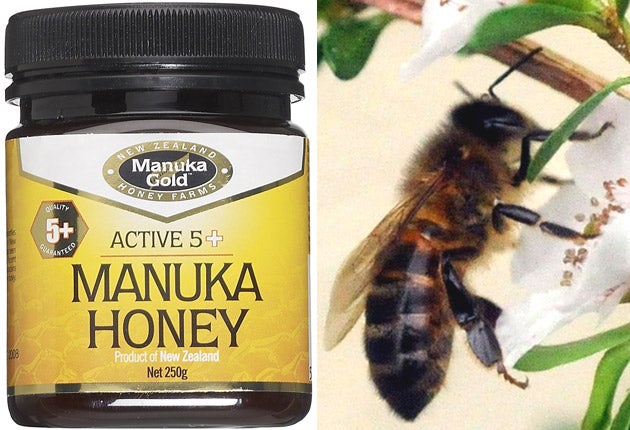Superbugs may have found their match in manuka bees

Your support helps us to tell the story
From reproductive rights to climate change to Big Tech, The Independent is on the ground when the story is developing. Whether it's investigating the financials of Elon Musk's pro-Trump PAC or producing our latest documentary, 'The A Word', which shines a light on the American women fighting for reproductive rights, we know how important it is to parse out the facts from the messaging.
At such a critical moment in US history, we need reporters on the ground. Your donation allows us to keep sending journalists to speak to both sides of the story.
The Independent is trusted by Americans across the entire political spectrum. And unlike many other quality news outlets, we choose not to lock Americans out of our reporting and analysis with paywalls. We believe quality journalism should be available to everyone, paid for by those who can afford it.
Your support makes all the difference.Manuka honey, the premium product found on fashionable breakfast tables, could play a role in the battle against antibiotic-resistant superbugs, scientists reported yesterday.
Honey is known to have antiseptic properties but the antibacterial potency of manuka honey, from New Zealand, is 10 to 50 times more powerful. It has been shown to stop the growth of antibiotic-resistant Staphylococcus aureus – the superbug that causes MRSA.
Manuka honey is derived from nectar collected by honey bees foraging on the manuka tree in New Zealand and is included in modern wound-care products such as dressings and ointments available on NHS prescription. However, its antimicrobial properties have not been fully exploited, according to researchers.
Laboratory studies by Professor Rose Cooper and colleagues at the University of Wales Institute, Cardiff, show that manuka honey interacts with three bacteria that commonly infect wounds – MRSA, Pseudomonas aeruginosa and Group A streptococci. "Our findings suggest that manuka honey can hamper the attachment of bacteria to tissues which is an essential step in the initiation of acute infections. Inhibiting attachment also blocks the formation of bio-films, which can protect bacteria from antibiotics and allow them to cause persistent infections," Professor Cooper said.
"Honey can make MRSA more sensitive to antibiotics – effectively reversing antibiotic resistance. This indicates that existing antibiotics may be more effective against drug-resistant infections if used in combination with manuka honey."
The long-term aim was to develop products combining honey with antibiotics that could be applied directly to infected wounds to speed healing and prevent the spread of suberbugs to other patients in hospital, she said. The findings were presented at a meeting of the Society for Microbiology in Harrogate.
"We will still need antibiotics taken systemically [orally] for blood infections. But we may be able to develop products with low concentrations of antibiotics and honey than can be applied directly to a wound."
Patients should not try applying honey from the jar to wounds as it was not sterile, Professor Rose warned.
Sweet medicine
* Honey has been used as an antiseptic for thousands of years. It was displaced by the arrival of antibiotics in the 1940s.
* Dressings impregnated with honey and ointments for applying to wounds are available on NHS prescription.
* Dressings using honey, which must be sterilised, create a moist, non-adherent surface around the wound, stimulate cell growth and act as an anti-inflammatory.
* The antibacterial potency of Manuka honey is said to be greater than ordinary honey because it has an extra component called methylglyoxal.
* Honey is said to contain anti-oxidants and enzymes that boost health and is used by naturopaths to help hay-fever sufferers in the belief that a daily teaspoonful will create a tolerance to local pollen, but the claims are unproven.
* Some people believe honey is healthier than sugar – but the British Nutrition Foundation says there is no truth in the claim.
Join our commenting forum
Join thought-provoking conversations, follow other Independent readers and see their replies
Comments